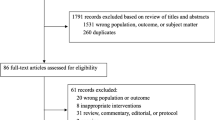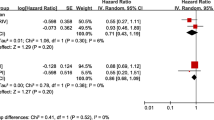Abstract
Background
Due to the high risk of ischemic and arterial or venous bleeding events in atrial fibrillation (AF) or venous thromboembolism (VTE) patients with renal impairment (RI), selection of appropriate anticoagulant regimen is important. Therefore, we systematically reviewed and compared the safety and effects of oral anticoagulants in AF and VTE patients with RI.
Methods
Eligible articles were identified through a literature search in PubMed, Embase, ClinicalTrials.gov, and the Cochrane Library for studies published between January 2008 and November 2020. Network meta-analysis was conducted with STATA 14.0 to analyze the effects and safety of each drug with regard to different levels of renal function.
Results
15 studies including 82,931 patients (76,957 with AF and 5974 with VTE) were analyzed. Compared with those of warfarin, the risk ratios of effect and safety outcomes of apixaban were 0.70 (95% confidence interval [CI] 0.60–0.82) and 0.56 (95% CI 0.42–0.76) in AF patients and 0.33 (95% CI 0.19–0.59) and 0.95 (95% CI 0.68–1.34) in VTE patients. Apixaban had the first or second highest probability of being ranked first with respect to surface under the cumulative ranking curve (SUCRA) scores in the prevention of major bleeding events, while in the prevention of ischemic events, rivaroxaban showed a higher SUCRA score (0.78–0.92) in mild RI patients and dabigatran showed a higher SUCRA value (0.90–0.99) in moderate RI patients.
Conclusions and Relevance
In the systematic review and meta-analysis, for AF or VTE patients with RI, direct oral anticoagulants performed comparably to or better than warfarin with regard to safety and effects. The network meta-analysis indicated that for patients with mild RI, apixaban might be safer for patients with a lower risk of ischemic events, while rivaroxaban might be suitable for patients with a lower risk of bleeding events. For patients with moderate RI, apixaban could reduce the risk of ischemic events without increasing the risk of bleeding events. For AF patients with severe RI, apixaban, rivaroxaban, and warfarin showed a similar effect. These results might provide suggestions for clinical arterial and venous thrombosis prevention.





Similar content being viewed by others
Reference
Piccini JP, Stevens SR, Chang YC, Singer DE, Lokhygina Y, Go AS, et al. Renal dysfunction as a predictor of stroke and systemic embolism in patients with nonvalvular atrial fibrillation: Derivation and validation of the R2CHADS2 index in the ROCKET AF and ATRIA study cohorts. Circulation. 2013;127:224–32.
Carrero JJ, Evans M, Szummer K, Spaak J, Lindhagen L, Edfors R, et al. Warfarin, kidney dysfunction, and outcomes following acute myocardial infarction in patients with atrial fibrillation. JAMA. 2014;311(9):919.
Genovesi S, Santoro A. Anticoagulants, renal failure and atrial fibrillation. Expert Opin Drug Saf. 2013;12(1):1–3.
Levy JH, Douketis J, Weitz JI. Reversal agents for non-vitamin K antagonist oral anticoagulants. Nat Rev Cardiol. 2018;15(5):272–81.
Zhu J, Alexander GC, Nazarian S, Segal JB, Wu AW. Trends and variation in oral anticoagulant choice in patients with atrial fibrillation, 2010–2017. Pharmacotherapy. 2018;38(9):907–20.
Granger CB, Alexander JH, McMurray JJ. Apixaban versus warfarin in patients with atrial fibrillation. N Engl J Med. 2011;35:981–92.
Hijazi Z, Hohnloser SH, Oldgren J, Andersson U, Wallentin L. Efficacy and safety of dabigatran compared with warfarin in patients with atrial fibrillation in relation to renal function over time—A RE-LY trial analysis. Circulation. 2014;130(22):961–70.
Fox KA, Piccini JP, Wojdyla D, Becker RC, Halperin JL, Nessel CC, et al. Prevention of stroke and systemic embolism with rivaroxaban compared with warfarin in patients with non-valvular atrial fibrillation and moderate renal impairment. Eur Heart J. 2011;32(19):2387–94.
Bohula EA, Giugliano RP, Ruff CT, Kuder JF, Murphy SA, Antman EM, et al. Impact of renal function on outcomes with edoxaban in the ENGAGE AF-TIMI 48 Trial. Circulation. 2015;134(1):24–36.
Hawkins NM, Jhund PS, Pozzi A, O’Meara E, Solomon SD, Granger CB, et al. Severity of renal impairment in patients with heart failure and atrial fibrillation: implications for non-vitamin K antagonist oral anticoagulant dose adjustment. Eur J Heart Fail. 2016;18(9):1162–71.
Wizemann V, Tong L, Satayathum S, Disney A, Akiba T, Fissell RB, et al. Atrial fibrillation in hemodialysis patients: clinical features and associations with anticoagulant therapy. Kidney Int. 2010;77(12):1098.
Abdulaali R, Zhou L, Gellad WF. Lee JK, Slack MK, Martin JR, et al. Effectiveness and safety of non-vitamin K antagonist oral anticoagulants for atrial fibrillation and venous thromboembolism: a systematic review and meta-analyses. Clin Ther. 2017;39(7):1456–78.
Higgins JPT, Thompson SG, Deeks JJ, et al. Measuring inconsistency ineta-analyses. BMJ. 2003;327:557–60.
Stevens LA, Coresh J, Greene T, Levey AS. Assessing kidney function–measured and estimated glomerular filtration rate. N Engl J Med. 2006;354(23):2473–83.
National Kidney Foundation. K/DOQI clinical practice guidelines for chronic kidney disease: evaluation, classification, and stratification. Am J Kidney Dis. 2002;39:S1-266.
White IR. Multivariate random-effects meta-regression: updates to Mvmeta. Stata J. 2011;11:255–70.
Higgins JP, Jackson D, Barrett JK, et al. Consistency and inconsistency in network meta-analysis: concepts and models for multi-arm studies. Res Synth Method. 2012;3:98–110.
Salanti G, Ades AE, Ioannidis JP. Graphical methods and numerical summaries for presenting results from multiple-treatment meta-analysis: an overview and tutorial. J Clin Epidemiol. 2011;64:163–71.
Lip G, Alsaady N, Ezekowitz MD, Banach M, Goette A. The relationship of renal function to outcome: A post hoc analysis from the Edoxaban versus warfarin in subjects undergoing cardioversion of Atrial Fibrillation (ENSURE-AF) study. Am Heart J. 2017;193:16–22.
Hohnloser S, Steg P, Oldgren J, et al. Does renal function influence the benefit of dual antithrombotic therapy with dabigatran in patients with atrial fibrillation undergoing percutaneous coronary intervention? results from re-dual pci. JACC. 2018;71:11.
Sarratt SC, Nesbit R, Moye R. Safety outcomes of apixaban compared with warfarin in patients with end-stage renal disease. Ann Pharmacother. 2017. https://doi.org/10.1177/1060028017694655.
Reed D, Palkimas S, Hockman R, Abraham S, Maitland H. Safety and effectiveness of apixaban compared to warfarin in dialysis patients. RPTH. 2018;2(2):291–8.
Coleman CI, Kreutz R, Sood NA, et al. Effectiveness and safety of rivaroxaban versus warfarin in patients with nonvalvular atrial fibrillation and severe kidney disease or undergoing hemodialysis. Am J Med. 2019;132(9):1078–83.
Miao B, Sood N, Bunz TJ, Coleman CI. Rivaroxaban versus apixaban in non-valvular atrial fibrillationpatients with end-stage renal disease or receiving dialysis. Dur L Haematol. 2020;104(4):328–35.
Stefan HH, Hijazi Z, Thomas L, Alexander JH, Amerena J, Hanna M, et al. Efficacy of apixaban when compared with warfarin in relation to renal function in patients with atrial fibrillation: insights from the ARISTOTLE trial. Eur Heart J. 2012;33(22):2821–30.
Hori M, Matsumoto M, Tanahashi N, Shin-Ichi M, Uchiyama S, Goto S, et al. Safety and efficacy of adjusted dose of rivaroxaban in Japanese patients with non-valvular atrial fibrillation: sub-analysis of J-ROCKET AF for patients with moderate renal impairment. Circ J. 2013;77(3):632.
Siontis KC, Xiaosong Z, Ashley E, Nicole B, Schaubel DE, Kevin H, et al. Outcomes Associated with Apixaban use in end-stage kidney disease patients with atrial fibrillation in the United States. Circulation, 2018;118.035418.
Chan KE, Edelman ER, Wenger Jb, Thadhani RI, Maddux FW. Dabigatran and rivaroxaban use in atrial fibrillation patients on hemodialysis. Circulation. 2015;131(11):972–9.
Stanifer JW, Pokorney SD, Chertow GM, Hohnloser SH, Wojdyla DM, Garonzik S, et al. Apixaban versus Warfarin in patients with atrial fibrillation and advanced chronic kidney disease. Circulation. 2020. https://doi.org/10.1161/CIRCULATIONAHA.119.044059.
Matthew RW, Veronica A, Kenneth TM, Shubham SB, Eric DP, Eric MA. Rivaroxaban versus warfarin in patients with non-valvular atrial fibrillation and stage IV-V chronic kidney disease. Am Heart J. 2020. https://doi.org/10.1016/j.ahj.2020.01.010.
Goldhaber S, Schulman S, Eriksson H, Feuring M, Fraessdorf M, Kreuzer J, et al. Dabigatran versus Warfarin for acute venous thromboembolism in elderly or impaired renal function patients: pooled analysis of RE-COVER and RE-COVER II. Thromb Haemost. 2017;117(11):2045–52.
Prins MH, Lensing AW, Bauersachs R, et al. Oral rivaroxaban versus standard therapy for the treatment of symptomatic venous thromboembolism: a pooled analysis of the EINSTEIN-DVT and PE randomized studies. Thromb J. 2013;11(1):21.
Agnelli G, Buller HR, Cohen A, Curto M, Gallus AS, Johnson M, et al. Oral apixaban for the treatment of acute venous thromboembolism. New Engl J Med. 2013;369(9):799–808.
Hokusai-VTE Investigators, Büller HR, Décousus H, et al. Edoxaban versus warfarin for the treatment of symptomatic venous thromboembolism. N Engl J Med. 2013;369(15):1406–15.
January CT, Samuel Wann L, et al. AHA/ACC/HRS Focused Update of the 2014 AHA/ACC/HRS Guideline for the Management of Patients With Atrial Fibrillation: a Report of the American College of Cardiology/American Heart Association Task Force on Clinical Practice Guidelines and the Heart Rhythm Society. JACC. 2019;2019(74):104–32.
Ortel TL, Neumann I, Ageno W, et al. American Society of Hematology 2020 guidelines for management of venous thromboembolism: treatment of deep vein thrombosis and pulmonary embolism. Blood Adv. 2020;4(19):4693–738.
Proietti M, Cheli P, Basili S, Mazurek M, Lip GYH. Balancing thromboembolic and bleeding risk with non-vitamin K antagonist oral anticoagulants (NOACs): a systematic review and meta-analysis on gender differences. Pharmcol Res. 2017;117:274–82.
Simon TA, Huang HY, Kawabata H, et al. How well do the 56,183 atrial fibrillation patients enrolled in the contemporary novel oral anticoagulant (NOAC) trials reflect the real world?[C] 140st APHA Annual Meeting and Exposition 2012. 2012.
Gomes T, Mamdani MM, Holbrook AM, Paterson JM, Helings C, Juurlink DN. Rates of hemorrhage during warfarin therapy for atrial fibrillation. Can Med Assoc J. 2013;185(2):E121.
Acknowledgements
We gratefully acknowledge the valuable cooperation of Dr. Jicheng Lv (Renal Division, Department of Medicine, Peking University First Hospital) in preparing this systematic review.
Author information
Authors and Affiliations
Corresponding authors
Ethics declarations
Funding
This study was supported by grants from the National Key R&D Program of China (No. 2016YFC0904900), National Natural Science Foundation of China (Nos. 81872940, 81973395, and 82073935), Natural Science Foundation of Beijing Municipality (No. 7171012), and National Science and Technology Major Projects for "Major New Drugs Innovation and Development" of China (Nos. 2017ZX09304028, 2017ZX09101001, and 2018ZX09201014).
Conflict of Interest
The authors declare they have no conflict of interest.
Code Availability
The code of network meta-analysis is available in Appendix 2 (see the electronic supplementary material).
Author Contributions
ZW is the guarantor of the entire manuscript. QX and YC contributed to the study conceptualization and design. KH and XZ contributed to the data curation, investigation, and interpretation. QX and ZL contributed to the drafting of the manuscript and critical revision of the manuscript for important content.
Supplementary Information
B®elow is the link to the electronic supplementary material.
Rights and permissions
About this article
Cite this article
Wang, Z., Xiang, Q., Hu, K. et al. Comparison of the Safety and Efficacy of Direct Oral Anticoagulants and Warfarin in Atrial Fibrillation or Venous Thromboembolism in Patients with Renal Impairment: Systematic Review, Meta-Analysis and Network Meta-Analysis.. Am J Cardiovasc Drugs 21, 643–657 (2021). https://doi.org/10.1007/s40256-021-00469-7
Accepted:
Published:
Issue Date:
DOI: https://doi.org/10.1007/s40256-021-00469-7




